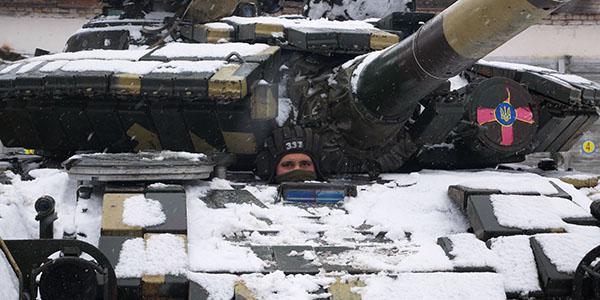No Easy Out for Russians in Ukraine
Russia faces no good choices for bringing its invasion of Ukraine to what it would call a successful conclusion, says a retired U.S. Army general who used to serve as a member of the U.S. diplomatic corps in Moscow. The general adds that most of the alternatives offered to achieve a desired outcome for the invasion are either ineffective or counterproductive. And, Russia’s veiled threats about its nuclear arsenal are brandishing to intimidate others and reassure its domestic population—but that too could backfire.
“The Russians have bitten off more than they can chew,” says Brig. Gen. Peter B. Zwack, USA (Ret.), former U.S. defense attache in the Moscow embassy from 2012-2014 and currently a Wilson Center global fellow in the Kennan Institute. Their invasion of Ukraine represents “unbelievable hubris, miscalculation and underestimation both of the Ukrainians’ capability and their motivation to fight,” he says. “And, war is as much about morale and motivation and will as it is about the tools.
“They [Russian leadership] grotesquely underestimated Ukraine, the young president—who is emerging as a young Ukrainian George Washington—and the size of Ukraine,” he declares.
Among the hurdles the Russian army faces are long logistics chains, muddy off-road conditions, a countryside “vibrating” with stay-behind Ukrainian troops and motivated civilians and home guards, he notes. “All you need to do is put Kalashnikovs and RPGs [rocket-propelled grenades] in their hands and they are every bit as lethal to long strung-out supply columns as Stinger missiles are to aircraft.”
The Russian army also is hindered by engaging in several urban fights simultaneously, he notes. “They can take things, but they can’t hold them very well in the current environment, and they have enraged an entire nation. And this nation borders a lot of countries, unlike isolated Chechnya.”
The Russians encountered a similar lack of success during their first military operation against Chechnya in 1994-1996. Russian forces using standard Soviet military doctrine were defeated by Chechen fighters using basic weapons such as RPGs, and the two sides agreed to a cease fire in 1996. The second Chechnya war began in 1999 and featured overwhelming Russian forces virtually flattening the Chechen capital Grozny as part of a methodical campaign that conquered the breakaway republic and returned it to Russian control under a puppet government. This onslaught represented the beginning of the modern Russian military, the general notes, as it transitioned from the old Soviet model.
Yet Gen. Zwack warns against drawing any parallels with Russia’s conquest of Chechnya. “It’s a matter of scale,” he says. “Chechnya was in the lowlands leading to the highlands in the Caucasus Mountains, and in this way it was somewhat isolated from the rest of the world.” Also, the country had a population of only a little more than 1 million people. Ukraine, with its 44 million people, is bordered by other European countries. Probably three-quarters of these people are “true patriotic Ukrainians,” Gen. Zwack offers, and the Russians sorely underestimated Ukrainian opposition.
Losing is anathema for Russian President Vladimir Putin, the general says. “His goal was to subjugate and dominate Ukraine, ideally through proxies but if necessary by force,” he explains. “He just doesn’t have that type of force to take on the whole country, as formidable as they are.
“I don’t believe time is on the Russian regime’s side,” he continues, noting the rise of street protests reminiscent of those preceding the fall of the Soviet regime in 1991. A large percentage of the force are conscripts who don’t want to be in Ukraine, and recent anecdotal reports have described pushback among these young soldiers and officers. That discontent must be trickling up, he adds, as oligarchs are abandoning support for the war and Putin publicly embarrassed his FSB chief. “It can’t all be good in that Byzantine, pressure-cooked Kremlin where Putin is running it like a mafia crime boss in relative isolation,” Gen. Zwack states.
If Russian power brokers see that their regime is threatened, “they’re survivors, and if they see the ship is going down, who knows?” Gen. Zwack offers. “They may try to find a way to try to be on the right side of history.”
Despite the information firewall the Russian government has erected to keep out unfavorable news, facts are trickling into Russia, he offers. Similarly, facts are trickling out about the invasion’s shortcomings.
That too can turn Russian public opinion into a powerful opposition force. If Putin tries to play the nuclear card more strongly than people are comfortable with, public opinion could turn against him. “If things really start to tilt down and Putin starts to wield the nuclear card, the people may say, ‘How dare you, Vladimir Putin, for risking my family, my friends, myself and my way of life by taking us down this way?’
“We’re far from that right now,” he continues. “But if it starts to turn south—and it looks like it really is—you’ll have a lot of Russian civilians … [opposed].” It will take time, he says, but the information firewall is beginning to crack.
“This fight is turning into a medieval primal fight,” the general says.
The soldiers on the ground who do not want to be there have been reinforced internally by elite guard members from a force of 200,000 across Russia who are occupation troops. But other troop alternatives could turn this war into a greater struggle, Gen. Zwack warns.
“If they [Russia] introduce Syrian urban fighters into Ukraine—maybe with Chechen fighters—if you think the Ukrainians are fighting with ferocity now, it will blow back so badly in the Russians’ face it will make their heads spin,” he warrants.




Comments